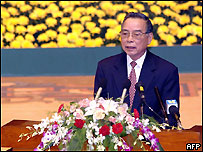|
Prime
Minister Phan Van Khai has told both The Washington Post and the
Associated Press that his forthcoming visit to Washington is
intended to deepen the bilateral relations between Vietnam and
the United States.
 |
| Prime
Minister Phan Van Khai. |
There was great
potential for them to develop ties in all fields despite past
difficulties and present differences, he said.
Mr
Khai is the first prime minister of a unified Vietnam to visit
the US and his journey will coincide with the 10th anniversary
of the normalisation of diplomatic ties between the two
countries.
He
told reporters that the Vietnam-US relationship had developed
rapidly, especially since their Bilateral Trade Agreement became
effective.
Two-way
trade between the two countries had increased from US$1.5bil in
2001 to $6.4bil in 2004, up 20 fold from 1995. In addition,
bilateral relations had been developed in science, health and
education.
There
was also co-operation in thwarting terrorism and the settling of
global problems. Vietnam had co-operated with the US in finding
American soldiers missing in the American War and the US has
helped Vietnam remove unexploded ordnance, provided information
about missing Vietnamese soldiers; helped people with
disabilities and built schools in war-ravaged regions.
Vietnam
had agreed to work with the US to implement an international
military-education training programme and Vietnam wanted to
begin with health care for soldiers.
Vietnam
had recorded great achievements during the past 20 years through
its process of doi moi, or renewal, the prime minister
told the reporters.
The
country had won important results with its external relations
strategy and wasted to be a friend and trusted partner within
the international community.
Vietnam
was now a country of peace, stability, safety and renewal.
Renewal was aimed at developing Vietnam's integration with the
region and the world. The country was putting aside the past and
looking to the future in its relations with the US.
The
two countries has both common and corresponding interests.
Vietnam
wanted to promote relations with the US by building friendship;
fostering a constructive partnership; multi-faceted
co-operation; stable stability and respect for each other's
interests.
The
prime minister said that Vietnam thinks of its people living
abroad as integrated with the country. They were its human
resources, he said.
All
could contribute to the building of the country regardless of
their past views provided they were not against the nation's
interests.
Overseas
Vietnamese were seturning home to invest trade and co-operate in
teaching and healthcare. The numbers opposing Vietnam among the
overseas Vietnamese community were few, he said.
WTO
the focus
Vietnam's
admission to the World Trade Organisation would be a crucial
focus of the Washington talks, the prime minister said.
Vietnam
wanted to successfully conclude its bilateral negotiations with
the US as soon as possible and join the world body.
A
negotiation team led by Deputy Prime Minister Vu Khoan had been
sent to Washington for this purpose.
But
if his own visit did not conclude the bilateral negotiations,
Vietnam would still expect President George W.Bush and his
Administration to support the country's admission to the World
Organisation as soon as possible, he said.
Vietnam's
admission to the WTO would have benefits for both it and the
United Sates. It would create opportunities for American
business in Vietnam. "We are brimful of hope that Vietnam
will join WTO by the end of this year," he said.
"But
it's not a last chance for Vietnam. The WTO Council meets to
each year to admit new members," he said.
Vietnam
wanted normal trading relations with the US; it also wanted the
US to recognise Vietnam as a market economy by removing the
Jackson- Vanick amendment.
The
prime minister said Vietnam was willing to co-operate with the
US in addressing the aftermath of war, including the clearing of
land mines and dealing with the consequences of Agent Orange.
Vietnam
was pleased with the co-operation between Vietnam and the US in
finding the remains of both American and Vietnamese soldiers
still missing.
Vietnam
wanted the US to help Agent Orange victims and in so doing
address the concerns of many people throughout the world.
Vietnam
recognised the help given by the US, especially the country's
non-government organisations, to help the victims of Agent
Orange and build schools in war-devastated regions.
The
prime minister is expected to have talks with US Defence
Secretary Donald Rumsfeld while in Washington.
The
two countries had an agreement for the Vietnam embassy in
Washington and the US Embassy in Hanoi to co-operate in
intelligence, he said.
There
is a staff post to share this intelligence, especially about
terrorism, transnational crimes and money-laundering."
The
prime minister said Vietnam was willing to discuss democracy,
religion, nationality and human rights with the US. This was an
opportunity to explain Vietnam's great achievements of the past
few years, he said.
In
Vietnam, the decisive rights to the country's destiny belonged
to the people.
The
National Assembly was their representative for supreme decision
making by the people. All laws passed by the assembly resulted
from opinions gathered from the people.
The
Vietnam Communist Party had been the guardian of the people's
interests and Vietnam did not need more political parties.
People still trust in the Party, he said.
"We
know that the both Party and State must deliver benefits to the
people and if they were not of benefit people would not accept
them".
(Source:
Viet Nam News)
|